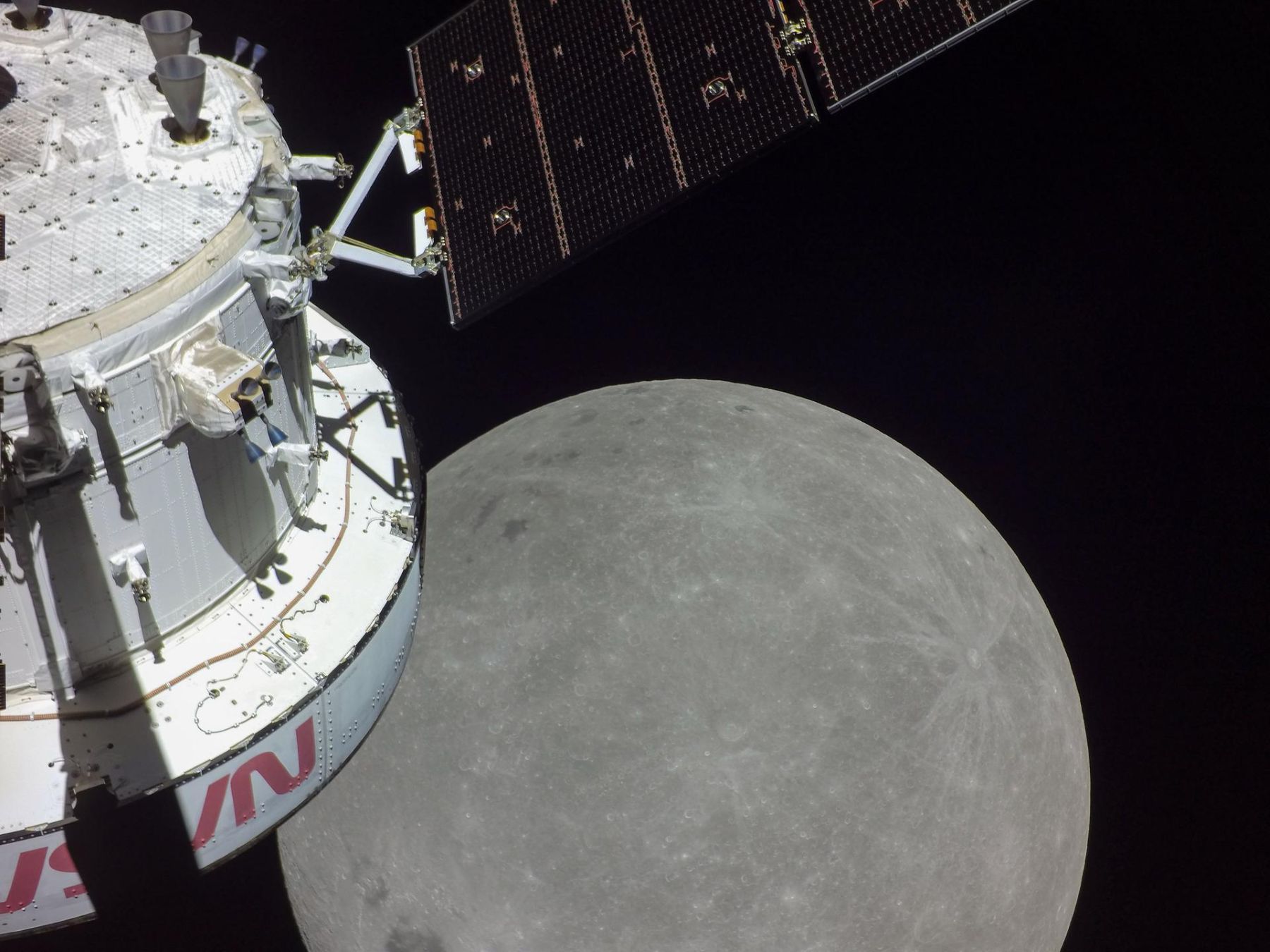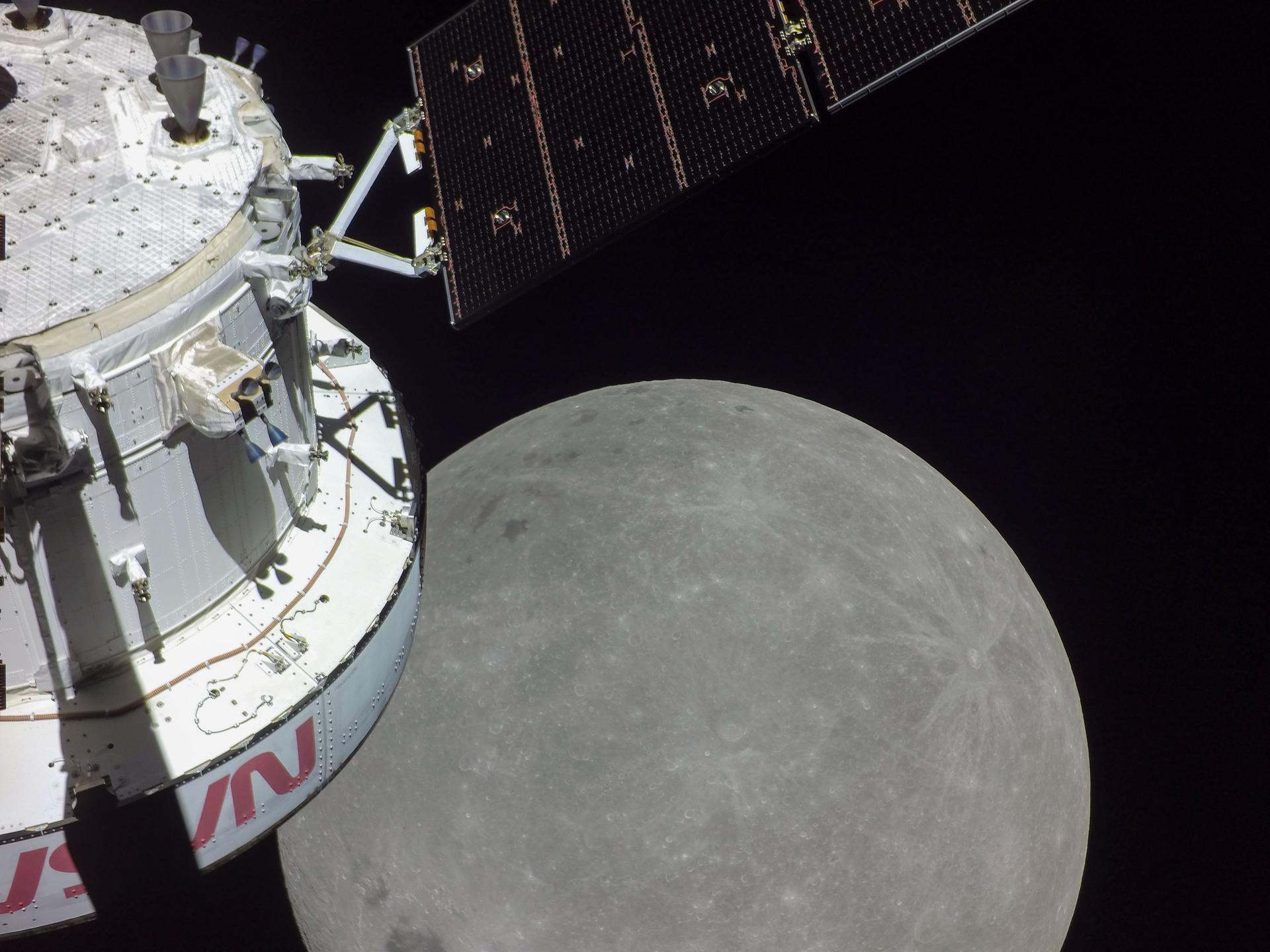Artemis I Team Receives Laurels Award for Team Achievement

The International Academy of Astronautics has awarded its 2023 Laurels for Team Achievement award to the international team that supported NASA’s Artemis I mission.

(Nov. 21, 2022) A portion of the Moon looms large just beyond the Orion spacecraft in this image taken on the sixth day of the Artemis I mission by a camera on the tip of one of Orion’s solar arrays. The spacecraft entered the lunar sphere of influence Sunday, Nov. 20, making the Moon, instead of Earth, the main gravitational force acting on the spacecraft. On Monday, Nov. 21, it came within 80 miles of the lunar surface, the closest approach of the uncrewed Artemis I mission, before moving into a distant retrograde orbit around the Moon.
NASA
The academy presented the award Oct. 1 during their Academy Day program, taking place in Baku, Azerbaijan, for extraordinary performance and achievement by a team of scientists, engineers, technicians, and managers in the field of astronautics.
Amit Kshatriya, deputy associate administrator for the Moon to Mars Program in the Exploration Systems Development Mission Directorate at NASA Headquarters, accepted the award on behalf of the Artemis I team. The award recognizes the contributions from NASA and partners around the world that supported the Artemis I flight test. Artemis I was the first of a series of increasingly complex missions to establish long-term exploration at the Moon and prepare to send astronauts to Mars.
“Contributions from teams at NASA and our international and industry partners made the success of the Artemis I mission possible,” said Kshatriya. “Together with this growing community, we’re conducting groundbreaking science at the Moon and preparing for humanity’s next giant leap to explore the Red Planet.”
The SLS (Space Launch System) rocket launched the uncrewed Orion spacecraft Nov. 16, 2022 from NASA’s Kennedy Space Center in Florida for a 25.5-day flight test that traveled a total of more than 1.4 million miles around the Moon and back to Earth. SLS flew as designed and with precision, and the Orion spacecraft successfully completed all test objectives while flying farther than any spacecraft built for humans has flown, reaching nearly 270,000 miles beyond the Moon. The mission paved the way for the first flight test with astronauts on Artemis II.
NASA is collaborating with commercial and international partners and establish the first long-term presence on the Moon through Artemis. The Laurels award recognized the contributions to Artemis I from ESA (European Space Agency), JAXA (Japan Aerospace Exploration Agency), Italian Space Agency, Israel Space Agency, and the German Aerospace Center. Additionally, the Deep Space Network facilitated space communications and navigation for Artemis I through ground stations in Australia and Spain. Industry partners recognized as part of the Artemis I team for the award included Aerojet Rocketdyne, Jacobs, Lockheed Martin, Boeing, Teledyne Brown, United Launch Alliance, Northrop Grumman, and Airbus.
“This award belongs to the thousands of skilled workers and their families that dedicated themselves to the development of the rocket, spacecraft, and supporting systems that demonstrated the beginning of what we can achieve in this new era of exploration,” said Kshatriya. “From factories around the world, to the assembly and launch from Kennedy, around the Moon and safely recovered from the Pacific Ocean, each contribution shares in this accomplishment.”
The International Academy of Astronautics is an independent non-governmental organization recognized by the United Nations with members are from more than 80 countries. Since its founding in 1960, the IAA has brought together experts in the disciplines of astronautics on a regular basis to recognize the accomplishments of their peers, explore and discuss cutting-edge issues in space research and technology, and provide direction and guidance in the non-military uses of space and the ongoing exploration of the solar system.
Through Artemis, NASA will land the first woman and first person of color on the Moon as we learn how to live and work on another world and inspire the next generation of explorers. The agency and its partners will explore more of the lunar surface than ever before using innovative technologies to unlock the mysteries of our solar system and our home planet for the benefit of all.




